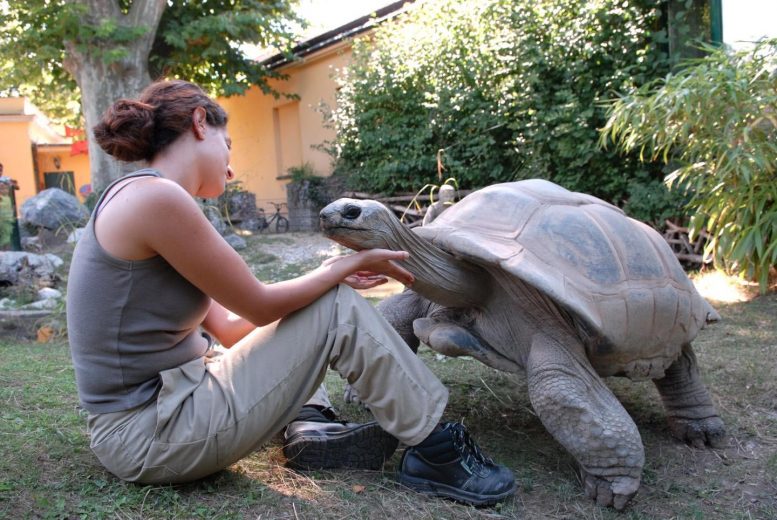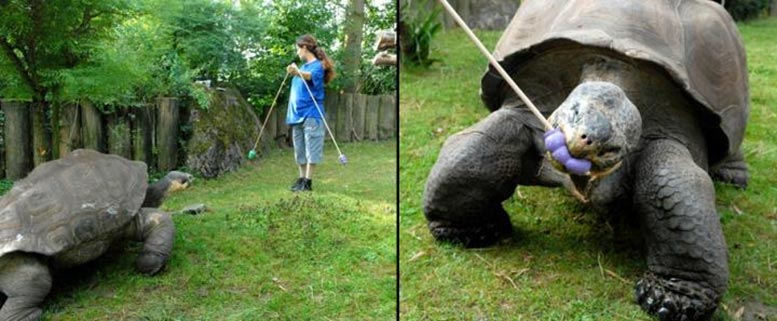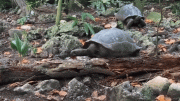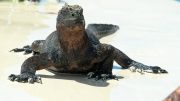
A friendship of a decade: Dr. Tamar Gutnick pets her favorite tortoise, George, a 100-year-old Aldabra tortoise housed in Vienna Zoo. Credit: OIST
Described as “living rocks,” giant land tortoises are lumbering beasts with a reputation for being sluggish in both speed and brainpower. But new research carried out by scientists from the Okinawa Institute of Science and Technology (OIST) suggests we have greatly underestimated the intelligence of these creatures, who can not only be trained but also have amazing powers of long-term recall.
“When first discovered, giant land tortoises were viewed as stupid because explorers could simply collect and store them on ships as a supply of fresh meat,” said Dr. Tamar Gutnick, first author of the study and a postdoctoral scholar in the OIST Physics and Biology Unit.
But Gutnick pointed out that there had been contradictory reports that hinted at their intellect. Darwin himself noted that Galapagos tortoises traveled long distances between where they ate, drank, slept or mud-bathed, requiring a good memory. Explorers also documented that they could be trained to stay in one place on the ships.
An adolescent Galapagos tortoise housed in Vienna Zoo picks the correct target to bite in a color discrimination training task. Credit: OIST
“We also observed firsthand that tortoises recognized their keepers, so we knew they were capable of learning,” added Gutnick. “This research shows the rest of the world just how smart they are.”
Teaching an old tortoise new tricks
The study, recently published in the journal Animal Cognition, is the culmination of almost a decade’s worth of work, starting when Gutnick was a master’s student at The Hebrew University and worked with Aldabra tortoises housed at Vienna Zoo.
“When I met the tortoises, I immediately fell in love with them,” said Gutnick. “It was clear to me that they all had very distinct — and often cheeky — personalities.”
In this latest research, Dr. Tamar Gutnick and Dr. Michael Kuba — who originally worked at Vienna Zoo and is now a staff scientist at OIST — trained Aldabra and Galapagos tortoises from Vienna Zoo and Zürich Zoo to perform three tasks of increasing difficulty. The researchers used a form of conditioning called positive reinforcement training, where they rewarded the tortoises for a correct action by treating them with their favorite food, such as carrot, red beet or dandelions.

Purple or green? Jumbo, a Galapagos tortoise from Zürich Zoo successfully bites the correctly colored target. Credit: OIST
For the first task, the scientists trained the tortoises to bite a colored ball on the end of a stick. Once mastered, the researchers then taught them to move towards and bite the colored ball, which was held around one to two meters away. For the final task, the scientists assigned each tortoise a unique color and trained the tortoises to choose the correctly colored ball, from two offered targets.
When the researchers tested the tortoises three months later, the tortoises immediately performed the first two tasks. Although they were unable to recall their correct individual colors for the third task, five out of six tortoises relearned which color ball to bite quicker than in the initial training, suggesting some residual memory.
The researchers also revisited three of the Aldabra tortoises they had trained nine years earlier which were still housed at Vienna Zoo. Remarkably, all three recalled the first two tasks, showing an incredible long-term recall ability befitting their long lifespan.
Who taught us? Another tortoise!
The long-term memory of the tortoises was not the only surprise in store for the researchers, as they also discovered that tortoises trained in groups learned faster than tortoises trained separately.
“This was a very unexpected result,” said Gutnick. “Giant land tortoises are not known for being particularly social animals but the increase in learning speed was unmistakable.”
The scientists speculate that giant land tortoises may gain important information in the wild, such as feeding and drinking locations, by watching other tortoises.
The only task where there was no clear benefit to learning in a group was the third task, as the researchers assigned each tortoise its own individual color. Therefore, the tortoises could not learn any useful information about which ball to bite by watching each other.
This result is the first documented evidence for social learning in Aldabra and Galapagos tortoises, highlighting how little scientists currently know about cognition in reptiles — a group often neglected by scientists due to a lack of availability.
“The problem is, you can’t keep a giant tortoise in a lab,” said Gutnick. “Thanks to zoos, we are able to gain access to these incredible creatures and explore reptile cognition further.”
Reference: “The underestimated giants: operant conditioning, visual discrimination and long-term memory in giant tortoises” by Tamar Gutnick, Anton Weissenbacher and Michael J. Kuba, 13 November 2019, Animal Cognition.
DOI: 10.1007/s10071-019-01326-6








Tortoises learn from people, never mind other tortoises! My tortoise perks up and will often start begging for eats when I open the fridge. She also remembers what words like ‘no’ mean! Good pets to have! And very warm hearted, despite their body temps.
Wow cool
I have a Hermann’s tortoise and she has adapted to every place we stay and does it quite quickly. She also adapted to us and now she actually asks to be fed and it’s a good thing because sometimes she doesn’t want to eat ever day so it is awesome that she will let us know. And, like the other story, she runs to the fridge especially if she smells or hears Romaine lettuce being prepared.
I have a 5 year old redfoot, who will literally throw a tantrum if i forget to put on his iPad aquarium youtube channels. He will flip his food and water dishes, and sulk.
is so cut and smart to!!!!
I’ve always known that Ted was cleverer than people think. But can their cognitive skills deteriorate?
He was found in a field and left with us whilst his owner was found. They weren’t. So, 52 years later, he’s still living with my Dad. But, recently, he keeps typing himself over. Dad says he’s “just plain stupid”. He’s still fast and very nosy. He has the run of the garden but we are worried that his flipping over is caused by senility.